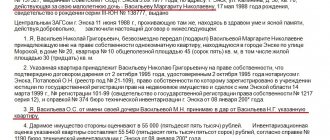In what cases is a deed of gift contested, providing for the return of an apartment?
An apartment donation agreement may be declared invalid even before it is signed in the following cases:
- An attempt was made to formalize a donation on behalf of a minor citizen (under 14 years of age) or a person declared legally incompetent.
- The apartment is donated to an employee of a medical, social or educational institution on the initiative of grateful clients or their relatives.
- The donated apartment is registered in the name of a government official as a reward for exceeding his working powers.
- It is possible to terminate the transaction in court if the gift was made in circumvention of the existing Bankruptcy Law (on behalf of a legal entity, no earlier than six months before the signing of the agreement officially declared bankrupt).
- The principle of gratuitous gifting is violated (the donor requires the recipient of the gift to perform some service in exchange for receiving real estate).
- If the donor, after signing the agreement, suddenly died without having time to register the agreement. Registration authorities cannot take responsibility for processing such a transaction.
If the above grounds for canceling a gift agreement are expressly provided for by current legislation, then the legal norms on the basis of which all transactions, including agreements to donate an apartment, will be invalidated will be given below.
They are characterized by the fact that the parties, or one of the participants in the apartment donation agreement, did not want to perform such actions, or tried to disguise other agreements with the help of them. The law in this case defines such contracts as sham. At the same time, each of them is distinguished into a separate legal fact.
- Imaginary transactions. They are characterized by the fact that the parties who signed the gift agreement do not actually receive any rights and obligations. For example, the donor remains to live in the apartment, pays utilities, and uses the apartment at his own discretion.
- Gift agreements concluded under moral or physical duress. For example, one of the parties, wanting to receive real estate, uses its moral or physical superiority and forces the other party to sign an unfavorable gift agreement against the will of the apartment owner.
- Transactions made fraudulently, or due to the difficult mental or financial situation of the donor.
This should include the deliberate actions of the recipient, who fraudulently forces him to give him an apartment, promising something in return, and after signing the contract does not fulfill his obligations. Or he takes advantage of a situation where a person urgently needs money for treatment, promising to transfer the required amount after registration of the apartment. But, in this case, there is no moral or physical pressure on the donor. - Sham agreements. In this case, the parties actually act as a seller and a buyer, but in order to avoid paying taxes and other obligatory payments, they act as a donor and a recipient.
It is important to understand that the process of terminating a deed of gift on the specified legal grounds presents a certain complexity. It consists in the fact that the plaintiff who applies to the court with such a statement of claim must collect a sufficient amount of evidence that should convince the court of the illegality of the donation transaction.
You can learn more about the conditions for challenging a deed of gift in this article.
One of the main questions regarding the process of canceling a deed of gift is whether it is possible to cancel a deed of gift for an apartment during the life of the donor. From established legal practice it follows that it is during the life of the donor that this is easiest to do.
This is due to the fact that he will be able to give the necessary explanations in court, and also point to irrefutable evidence. In addition, this process can not be brought to court, but can be resolved voluntarily with the gifted person.
Read about how to challenge a deed of gift after the death of the donor in this material.
There are two ways to challenge such a transaction when the donor is alive.
- Voluntary order.
It involves sending the parties to the transaction to each other special letters - notifications, which will indicate that the donor, or the one who has become the new owner of the apartment, does not want to fulfill their obligations. But in order to terminate the agreement in this way, the law requires the occurrence of one or more legal facts specified in Article 578 of the Civil Code. But this does not apply to the case where the donor was deprived of the life of those to whom he transferred his property free of charge. - Judicial order.
This process involves drawing up a statement of claim and filing an appeal to the district court on whose territory the disputed property (apartment) is located. In this case, the plaintiff will be the one who donated the apartment, and the defendant will be the one who took it into his ownership. This method of protecting one’s rights applies not only to the cases specified in Article 578 of the Civil Code, but also when the transaction was fraudulent, feigned or violent. Naturally, if the donor is deprived of life, then the legal heirs will file a claim.
More details about canceling a deed of gift during the life of the donor can be found here.
It is important to know that in case of voluntary cancellation of the deed of gift, the mutual refusal of the transaction must be formalized by a notary.
Form of voluntary agreement to terminate a real estate gift agreement.
Form of claim for termination of the apartment donation agreement.
In order to consider this issue, you need to understand that ownership of any real estate does not begin from the moment of concluding an agreement (in our case, donation), but from the time of special registration.
We invite you to read: How to terminate a loan agreement If you become disabled
It means entering information about the ownership of an apartment into a special state register. Only after officials carry out such actions does a new owner appear for the real estate.
Now we will consider the question of the possibility of canceling the deed of gift when the registration of the new owner has occurred. There's nothing wrong with that.
If the transaction was terminated by mutual written consent of the parties, then the agreement is certified by a notary and submitted to the registration service. Its officials check the correctness of such an agreement, the presence of all details, including notarization, after which they make the appropriate changes to the register, and the apartment again belongs to the donor.
If the cancellation of the gift agreement occurred in court, then the original court decision must be brought to the registration service, which has entered into legal force, which must bear a seal, as well as the signature of the judge who made the decision. Officials will immediately re-register the real estate to the new owner.
It is important to know that if officials of the registration service refuse to register real estate according to the above documents, their actions can be appealed to a higher authority or court.
What does the termination of a deed of gift for an apartment entail?
An apartment is an object of real estate, therefore all transactions on the transfer of ownership of it are clearly regulated by the Civil Code in Russia.
A deed of gift (donation agreement) is one of the forms of transfer of ownership of such a piece of real estate from one person to another. But it differs from other agreements in that such a transfer of rights is free of charge, unlike, for example, the purchase of an apartment. When buying and selling, one party (the seller) receives material compensation for his property from the other party to the transaction (the buyer).
A gift deed is a written agreement between two persons. According to it, one party is obliged to transfer real estate (as a gift), and the second, accordingly, accept the apartment.
Based on such legislative requirements, the rules providing for their cancellation and invalidity also apply to these agreements.
Accordingly, the Civil Code says that if a transaction is canceled or invalid, the rights of the parties are restored to the extent that existed before the agreement was signed. In simple terms, the donor gets the apartment back, but the one who received it as a gift is not entitled to anything, since the transaction was initially free of charge. More information on how to return an apartment to the donor voluntarily can be found here.
It is important to understand that when
cancellation of deed of gift
, all persons who managed to register in the apartment must de-register voluntarily, or the new owner has the right to apply to the court with a statement of claim and forcefully deregister these citizens.
Form of apartment donation agreement.
Features of termination of a gift agreement
According to the law, donation refers to a special series of transactions, which implies some differences in their termination. Despite this, civil law provisions in relation to all such agreements must be followed.
Termination of legal relations is possible in the following categories:
- Bilateral termination of the transaction (by mutual consent of the donor and recipient of the property).
- Unilateral termination (the same case when the donee refuses to accept such a gift).
- Challenging a signed agreement when going to court (only if there are compelling reasons and their evidence).
- Invalidity of the agreement (based on the criteria described above).
Revocation of deed of gift
As mentioned above, the donor cannot terminate the deed of gift unilaterally without compelling reasons. You can revoke a gift agreement through the court if one of the following reasons exists:
- The donor's health condition has deteriorated significantly. Changes in marital status or financial status are also possible, due to which a person’s quality of life does not change for the better.
- The recipient died. Property can be returned only if the grounds for this were specified in the contract. Otherwise, the deceased's property will become part of his estate.
- The donee caused harm to the donor or members of his family, attempted murder or committed murder.
- The donated property was damaged due to the fault of its new owner.
Procedure for canceling a transaction
As stated above, the transfer of apartments as a gratuitous gift is a civil contract that can be canceled or declared illegal. In this regard, the Civil Code provides for two legal ways to cancel a deed of gift:
- the first method is the legal facts directly stated in Article 578 of the Civil Code;
- the second method is the legal actions of the parties who, under the gift agreement, meant other transactions, or took possession of property through deception, physical or moral violence against the donor.
Let's consider the first method.
Article 578 of the Civil Code establishes the following legal facts, the occurrence of which directly entails the cancellation of the gift agreement.
- When various bodily injuries are caused to close relatives or the donor by the one who received the property (apartment) as a gratuitous gift. This also includes an attempt on the life of the donor or his relatives (close and distant), but without actual deprivation of life.
- If the donor finds himself in a difficult financial situation, or has lost his only home.
- If the person who received the apartment as a gift is negligent towards its safety and integrity. For example, intentional damage to property, in which the property lost part of its marketable value or was completely destroyed (fire, flooding, explosion, and other actions leading to destruction).
- In case of premature death of the recipient, that is, he will pass away before the donor. But here the law provides a clear clause; such a condition must be stated in the agreement and notarized. Otherwise, such real estate will become the object of inheritance by law or will.
- If the donor turned out to be an individual entrepreneur, or a legal entity, who thus tried to withdraw their property from confiscation and forced sale in situations where they were declared bankrupt, or the corresponding liquidation procedure was initiated.
- When the life of the donor is taken by the recipient. In this case, the procedure for invalidating the agreement begins upon the claim of a close or other relative of the former owner of the apartment.
If the parties, after signing the gift agreement, have not completed other mandatory actions. For example, the apartment was not registered to another owner in the state register.- The last is the conclusion of a gift agreement by a person who, in accordance with the procedure established by law, was declared incompetent, or at the time of signing the documents was under the influence of alcohol, drugs, or suffered temporary mental insanity.
Citizens who are over 18 years of age are recognized as legally capable, and their rights are not limited by the court (mental insanity, guardianship). Temporary mental insanity can occur under the influence of various factors, and is characterized by the fact that it passes after some time, without recognizing the person as incompetent.
We suggest you read: How to save an apartment during a divorce
These grounds are expressly specified in the law, the occurrence of which entails the automatic cancellation of the deed of gift.
It is important to understand that the above terms and conditions do not provide for automatic cancellation. In order to declare a transaction invalid on such grounds, you must file a statement of claim in court, in which you must indicate one of the above-mentioned legal facts, supporting your claims with relevant evidence.
Read more about canceling an apartment donation transaction in this article.
In the case of cancellation of a transaction by mutual desire, everything is clear. It is better to immediately contact a notary, who will help you draw up all the documents correctly and monitor the execution of such an agreement. But such cases do not occur often in practice.
If you decide to go to court, it is better to follow the advice of professional lawyers.
- First of all, you need to analyze the current situation and make a decision on what basis you can terminate the deed of gift.

If one of the situations provided for in Article 578 of the Civil Code arises, then you need to collect all the evidence (for example, an act of causing bodily injury, an expert’s opinion that the apartment was damaged by fire, water or other means), and then draw up a statement of claim, in which you indicate collected evidence and submit it to court.- In case of challenging a deed of gift, when real estate was taken by fraud, under the influence of physical or moral pressure, you will first need to contact law enforcement agencies, who must give a legal assessment of what happened.
It would be good if a criminal case is initiated and the culprit is sentenced to punishment. This is a strong argument for the court, and it will cancel the deal. But if there is a refusal to initiate a criminal case, then you will have to prove such facts on your own. It is better to do this through medical and psychological examinations of the victim.
- When concluding imaginary and feigned transactions, the main evidence base will be documents and witnesses. For example, on the gift side they are not relatives. It is necessary to prove the fact of purchase and sale. For this purpose, certificates confirming the withdrawal of cash from the bank accounts of the person who received the gift and other similar documents are suitable.
- If it was not possible to collect all the necessary evidence on your own, then you need to file a petition in court to obtain it from the competent authorities and institutions. It is important to remember that any government body, enterprise, or institution does not have the right to refuse such a legal request.
- To prevent real estate from being sold while the claim is being considered, it is necessary to seize it by a court decision, and remove it only after appropriate registration of your rights in the unified state register of real estate.
Only by acting in this way can you expect a positive result.
It is important to remember that canceling a deed of gift is not so easy. To do this, you need not only to convincingly convey your position, but also to support your words with concrete evidence.
The current legislation establishes an exhaustive list of situations that allow you to cancel a deed of gift. This can be done through mutual agreement or by court order.
Preparing to go to court
You should only turn to the judiciary for help if you have verified and indisputable evidence. The testimony of witnesses alone will not be enough when complaining about an illegal transaction; the court will require one or more of the following documents to be presented:
- Orders for inspection of the apartment and final acts.
- Certificates and extracts from medical institutions.
- Photographic materials.
- Extracts from accounting journals.
- Video and sound recordings.
To achieve a speedy consideration of the case, it is advisable that all documents be notarized and contain indications of the current date. The court will necessarily check them for authenticity and compliance with the required standards.
After collecting a package of refuting documents, they should be certified by a lawyer who deals with such cases on a professional level.
Procedure for canceling a transaction
In accordance with the established legislation of the Russian Federation, before signing an agreement and transferring ownership of the property to the recipient of the apartment, a number of certain procedures are carried out, and the necessary documents are collected.
In this regard, you can try to terminate the agreement if an error is found in the text of the agreement or a discrepancy in the clauses of the agreement. Violations in the execution of the deed of gift can also become a reason for canceling the transaction and returning the real estate to the original owner.
For example:
- One of the owners of the apartment (if it is part of common joint ownership) did not provide his written consent or it was not certified by a notary.
- The fact of involuntary signing of a deed of gift was proven (using blackmail, deception, and hypnotic influences on the human psyche).
- The donor was deliberately misled regarding the terms of the contract.
- The conclusion of the transaction involved persons who are prohibited by law from accepting such gifts (officials, doctors, etc.).
- The transaction was proven to be fictitious. In legal practice, there are many cases where, under the guise of a donation, an attempt was made to sell the specified apartment in circumvention of existing legislation.
- The use of forgeries, fictitious signatures and similar deception. Digital technology makes it possible to forge documents so that at first glance they cannot be distinguished from the originals. However, such transactions are illegal and are prosecuted.
When can you revoke a deed of gift for a house?
A gift agreement can be revoked if certain grounds exist, in particular:
- when there is a noticeable deterioration in the quality of life of the donor, his financial or other situation;
- when identifying actions on the part of the recipient of the gift aimed at causing harm to the health of the donor, as well as a threat to his life;
- in the event of the death of the recipient of the gift, if this moment is described in the contract;
- if the recipient, through his actions, caused significant damage to the received property.
The agreement can be revoked by mutual consent of the parties or through a judicial procedure.
Cancellation of deed of gift at the initiative of the state
You can also terminate a deed of gift for an apartment if it was initiated by the state (representatives of state bodies). In this case, the application will be considered by the court if the prosecutor's office or investigative authorities present irrefutable evidence that the transaction was fictitious and was a cover for fraudulent machinations. For example, the donor knowingly evades paying taxes on the apartment in question or government duties.
We invite you to familiarize yourself with: Deed of gift between close relatives according to the law of the Russian Federation
In addition, it is possible to terminate the signed agreement if the donor is a legal entity that was officially declared bankrupt shortly before the execution of the agreement. This is due to the fact that individual entrepreneurs, by transferring real estate, are trying to evade fulfillment of debt obligations.
It is possible to cancel a donation if representatives of the guardianship authorities for minors have applied to the court with a statement that as a result of the transaction, the financial condition of young or minor children has significantly worsened and poses a threat to the child’s health.
The power to challenge and cancel deeds of gift is granted only to the judiciary.
In accordance with current legislative norms, unilateral refusal to fulfill contractual obligations is not permitted. The termination procedure can be carried out exclusively by agreement of both parties or on the basis of a court decision (subject to conditions stipulated by law).
If we are talking about a gift agreement, the current legislation allows for deviations from the general rules, providing the possibility of unilateral refusal to fulfill the obligations of the agreement.
Judicial practice does not use such a concept as termination of a gift agreement. Instead, the concept of “cancellation of donation” applies. This case considers a situation where the donor can cancel the gift based on certain factors. The contract may also be declared invalid.
Is it possible to terminate the contract?
Answering the question whether a gift can be canceled is theoretically very easy, because, as with other transactions, there is a certain cancellation procedure. In practice, the main problem becomes the fact that the annulment of an agreement requires the mutual consent of both parties; without it, resolving the issue becomes possible only through the court. The legal relationship between the donor and the recipient is regulated by Article 578 of the Civil Code of the Russian Federation, which names only a few reasons according to which a donation can be canceled unilaterally:
- the recipient has committed a criminal act against the person who acted as the donor;
- having received the gift, its new owner began to treat the new property carelessly, creating a threat to its integrity and safety through his actions;
- consent was not obtained for the transaction from the other half of the donor, provided that the house was in their common ownership;
- the transaction is imaginary in nature, that is, it is an action designed to cover up some other act, in most cases illegal;
- the concluded agreement did not go through the official registration procedure or violated current legislation;
- the donor turned out to be bankrupt;
- the donor was forced to sign the contract or did so while in a state of insanity;
- in the event of the death of the recipient of the gift.
Note: The initiator of cancellation can be not only the donor, but also a third party, while the collection of evidence falls entirely on the shoulders of the plaintiff.
As can be seen from the above, it is possible to cancel a donation, but how to do it and how difficult this procedure will be is another matter. Even if the matter looks simple and obvious, you should not take on it alone; you cannot do without qualified legal assistance. You shouldn’t expect to find all the necessary information on the Internet either, since there can be many reasons for canceling a gift agreement, and there are simply no universal recipes. Any specific situation is individual, and accordingly, the claim for each case is different, but the text of the application should always contain the following information:
- name of the body to which the appeal should be made;
- data of each of the parties participating in the agreement;
- the grounds and reasons according to which the intention to cancel the gift agreement is expressed;
- a list of evidence substantiating the plaintiff’s claims;
- date and signature of the applicant.
Termination of the contract at the initiative of the donor
Termination of a gift agreement may occur in the following cases:
- The donee intentionally committed unlawful acts against the donor or members of his family (for example, causing grievous bodily harm, attempted murder, and so on).
- The contract can be terminated unilaterally if the donee’s handling of the donated item creates a threat of its irretrievable loss. If the donated item is of significant non-property value to the donor, he has the right to cancel the donation through litigation.
- The contract stipulates that the donated item returns to the donor if he survives the donee.
- If the conclusion of a gift agreement in the future will lead to a significant decrease in the donor’s standard of living (for example, a deterioration in financial, family or health status).
Grounds for cancellation/cancellation of a contract after registration
You can cancel a gift deed after registration if there are such circumstances that are considered sufficient grounds for canceling the deed of gift (Article 578 of the Civil Code of the Russian Federation):

- criminal acts of the recipient of the gift against the donor or members of his family - beatings and other bodily injuries or attempted murder, as well as deprivation of life;
- if the handling of donated real estate, which is of great intangible value for the donor (for example, the memory of a happy childhood spent with parents in a house, apartment or country house) threatens the loss of the object of donation;
- in case of registration of a deed of gift under physical or moral pressure, i.e. under duress;
- when the donee died before the donor, and such an outcome is taken into account in the gift agreement.
Clause 2 art. 578 of the Civil Code of the Russian Federation states that the cancellation of a deed of gift is possible only in court if the donor died as a result of the actions of the donee (the initiative for legal proceedings in this case should come from the heirs of the deceased) or in case of inappropriate attitude towards the gift.
Expert opinion
Irina Vasilyeva
Civil law expert
Art. 579 of the Civil Code of the Russian Federation allows for the impossibility of canceling a gift agreement, but only in relation to gifts of low value. You can cancel a deed of gift for an apartment, house, land, etc.: these are expensive large gifts, to which Art. 579 of the Civil Code of the Russian Federation is not applicable.
Termination of the contract at the initiative of the donee
The agreement can be terminated at the initiative of the donee if the donee refuses the gift at any time before the transfer of property. In this case, it should be remembered that the donor has the right to demand compensation from the recipient for damage caused by refusal to accept the gift (provision of Part 3 of Article 573 of the Civil Code of the Russian Federation).
The following factors should also be considered:
- Refusal to fulfill the contract is possible only before the transfer of the gift. It is impossible to refuse a gift that has already been accepted.
- Current legislation does not provide for the possibility of refusing part of the gift. In this case, it is appropriate to use not the concept of “refusal to fulfill the contract”, but the concept of “change in the terms of the document”. However, in accordance with Article 450 of the Civil Code of the Russian Federation, changes to the provisions of the contract are possible only by mutual agreement of the parties.
- Refusal to accept a gift is relevant only when concluding a consensual agreement (the document contains a provision on the donor’s obligation to transfer the gift in the future). If a real gift agreement is concluded, the recipient does not have the right to refuse the gift, since the moment of drawing up the document coincides with the moment of its execution.
Cancellation of a gift agreement
It is possible to refuse a gift or cancel a transaction only in a number of cases provided for by law. The donor can specify the terms of termination in the contract independently, or the cancellation will be carried out in accordance with Articles No. 577-578 of the Civil Code of the Russian Federation.
You can cancel a deed of gift if:
- The donor's financial situation or well-being has changed so much that the transfer of property as a gift will cause him significant damage.
- The donee made an attempt on the life and health of the donor or his family. He caused bodily harm to the above citizens. If the donor has died, then his successors can terminate the contract.
- The recipient, after receiving a gift of property that was valuable to the donor, treated it carelessly, which led to its damage or loss. In this case, the donor can terminate the transaction through the court. However, he will need to provide evidence that the donated property is truly valuable.
- The property was donated to a legal entity that became bankrupt. In this case, the bankruptcy trustee has the right to demand termination of the contract.
Important! After the deed of gift is cancelled, the donated property must be returned to the donor unchanged.
It is also necessary to take into account that the donee does not have the right to demand compensation after cancellation of the deed of gift. The donor, upon termination of the gift agreement by the donee, may demand that the latter reimburse the expenses incurred by going to court.
Invalidation of the gift agreement
Judicial practice provides for the possibility of declaring a gift agreement invalid on the general grounds for recognizing transactions as invalid. For example, cases where a gift agreement is concluded to cover another transaction (for example, the purchase/sale of property) are considered quite common. Such transactions are considered invalid.
An agreement providing for the transfer of a gift to the donee after the death of the donor is considered void.
A contract can be terminated unilaterally through litigation in the following cases:
- If the donation procedure was carried out by a legal entity or entrepreneur at the expense of funds related to business activities within six months before the person was declared insolvent (bankrupt).
- A gift agreement may be declared invalid if the document provides for the need for the donee to perform any actions in order to receive the gift.
- If a gift agreement was drawn up but not signed due to the death of the donor.
- If the agreement does not comply with legislative norms and requirements of other legal acts.
- If the contract was made by a citizen declared incompetent due to a mental disorder.
- A minor cannot act as a donor.
- An agreement is considered void if the transaction is made by a person with limited legal capacity (as a result of alcohol or drug abuse) without the consent of the trustee.
- If the contract was made by a capable citizen who was in a state where it was not possible to bear responsibility for his own actions.
- If the procedure was carried out under the influence of a misconception regarding the transaction.
- If the donation mechanism is carried out on the basis of deception, violence or threats.
Grounds and reasons for terminating a gift agreement in 2021
Since the gift agreement represents a special category of agreements, in order to terminate the transactions the plaintiff must have good reasons, which are provided for by the current Russian legislation. Thus, in 2021, both general and special grounds for termination of the contract can be applied to legal relations under deed of gift.
The grounds of the first type today include recognition of the transaction as invalid, while special grounds include the donor’s refusal to fulfill the agreement and the recipient’s refusal to accept the object of the transaction under the conditions determined by the legislator for such situations.
It is worth noting that the grounds for terminating a real deed of gift are formed only after the completion of a gift agreement , and for terminating a consensual agreement or a promise of a gift agreement, it is enough to record a violation of the conditions and procedures during the transaction.
At the same time, the grounds for recognizing the gift agreement as invalid must actually precede the conclusion of the agreement or appear upon signing the deed. Simply put, in this case there must be direct violations of the conditions and procedure for making a donation established by the legislator.
General grounds for invalidating a gift
In our last article, we mentioned that, despite its ambiguity, a gift agreement refers to bilateral transactions. Therefore, in order to recognize a deed of gift as invalid, the general grounds established in Articles 166-178 of the Civil Code of the Russian Federation can be applied. For example, Article 166 of the Civil Code of the Russian Federation defines 2 types of invalid transactions:
- voidable transactions;
- worthless transactions.
Agreements that are invalid due to violation by the parties of established legal norms are initially void and can be canceled without a court decision, in contrast to voidable transactions, which can be terminated only after the relevant court decision is made.
Articles 168-179 of the Civil Code establish a list of general grounds, the presence of which leads to the invalidity of a transaction. We invite you to consider the most important of them, as well as familiarize yourself with the grounds that relate directly to gift agreements:
- the transaction is imaginary and concluded for show;
- the agreement was concluded to cover up another agreement (the so-called sham gift agreement);
In the 2 listed cases, the parties to the transaction do not have the goal of implementing legal relations that correspond to the gift agreement.
An example of a sham transaction is a situation where a legal entity or individual makes a donation, wanting to avoid confiscation of property by creditors. Thus, the donor enters into a deed of gift, initially intending to “circumvent” the rules established by the legislator and has no intention of transferring the property to the donee.
In Article 170 of the Civil Code one can find the definition of the above-mentioned transaction as void. The same will be considered as a gift agreement, with which the parties cover the purchase and sale.
- the deed of gift contains a condition that the object of the donation will be transferred to the donee after the death of the donor (3 paragraph 572 of the article);
Using a gift agreement to transfer property or rights after death is unacceptable! For these purposes, the law provides for a will.
- the gift agreement was concluded with errors or violations of form, subject or content.
Everything is clear here. Let us only note that an example of a violation of the form of a deed of gift may be the choice by the parties of an oral form of a gift agreement for objects, the ownership of which must be officially registered without fail. A void contract, for example, will be an agreement in the content of which there will be no designation of a gift (according to paragraph 2 of Article 572 of the Civil Code).
Also, it is worth considering categories of citizens who cannot, according to the provisions of Articles 575 and 576 of the Civil Code of the Russian Federation, act as parties to the donation:
- for the receiving party (donee) - citizens who are prohibited by law from accepting gratuitous gifts in connection with the performance of their official obligations or due to other factors related to their professional activities (employees of social services, educational, educational, medical institutions, as well as government employees and etc.);
- for the party transferring the gift (donor) - to citizens who are limited in making a gift and to persons who are prohibited from making gifts to others (for example, legal entities in transactions in which the gift is property belonging to them by right of economic or operational management, if these persons have not received the consent of the real owner of this property, etc.);
- legal entities engaged in entrepreneurial and commercial activities in relations with each other;
ARTICLE RECOMMENDED FOR YOU:
Real estate gift tax from 2021 for individuals - how much you will have to pay
An actual violation of the deed of gift may be the presence in the content of the gift agreement of a consideration or the presence of an indication in it that the promise of a gift is conditional on the mandatory fulfillment of some obligation on the part of the donee.
- the transaction of gratuitous donation was made by a person limited in legal capacity or completely incompetent (Article 171 of the Civil Code of the Russian Federation, as well as Article 176 of the Civil Code of the Russian Federation) or by a person who, at the time of the transaction, was in a state that did not allow him to understand the situation and/or direct his own actions ;
- the deed of gift was concluded through a mistake by one of the parties (Article 178 of the Civil Code of the Russian Federation) or under the influence of threats, deception and other negative circumstances (according to information from Article 179 of the Civil Code of the Russian Federation).
Termination of a deed of gift at the initiative of the donor
In 2021, termination of a gift agreement at the initiative of the donor becomes possible exclusively on special grounds, implying the complete cancellation by the donating party of the executed deed of gift or the donor’s refusal to fulfill the obligations that he was supposed to fulfill based on the contract of promise of gift.
Thus, unilateral cancellation of a donation, in accordance with the provisions specified in Article 578 of the Civil Code of the Russian Federation, can be carried out in the following 3 cases:
- if the donee dies before the party who gave him the gift and this clause was agreed upon by the parties and is present in the content of the contract;
- if the donee does not properly care for the property donated to him, as a result of which it may be damaged (lose its properties) or completely destroyed (in this case, the donated property must have great intangible value for the donor, of which the donee must be aware);
- if the donee has made an attempt on the health or life of the donor himself or his close relatives.
The list of grounds established for refusal to fulfill a promise of gift agreement is contained in Article 577 of the Civil Code of the Russian Federation. Let's look at them:
- as a result of the transaction, the donor’s health, family or financial situation has significantly deteriorated, which will definitely reduce the quality of his standard of living;
In this case, it is very important that any of the changes described above occur as soon as possible after the conclusion of the deed of gift.
- If the donee has committed any illegal actions in relation to the donor himself, a list of which can be found in paragraph 1 of Article 578 of the Civil Code of the Russian Federation.
It is worth noting that, since the donor’s fault under these circumstances is excluded, the legislator completely exempts this person from compensation for damage to the donee (Clause 3, Article 577 of the Civil Code of the Russian Federation). At the same time, termination of a gift agreement if the donor refuses to fulfill his obligations is regulated on these grounds by Articles 451-453 of the Civil Code of the Russian Federation.
In addition, the legislation in force in 2021 provides for another basis, the presence of which allows the donor to refuse obligations regarding the transfer of a gift under a deed of gift - the destruction of the object of the transaction itself, a ban on its use at the legislative level, or the withdrawal of the gift from civil circulation.
Termination of a gift agreement at the initiative of the donee
Unilateral termination of a deed of gift at the request of the donee today becomes possible in the only case - if he exercises his right to refuse to accept the gift offered to him (Article 573 of the Civil Code). However, this person can exercise this right only if the gift agreement contains the donor’s promise to transfer the specified gift within a specified period. Simply put, the recipient can refuse the gift before accepting it.
In paragraph 2 of Article 573 of the Civil Code of the Russian Federation, a rule is established for making such a refusal at the initiative of the donee. Its essence is as follows:
- If the object of the gift is real estate, transactions with which require mandatory re-registration of ownership, refusal to accept such property also requires state registration.
- If the agreement was concluded between the parties in writing, the refusal must also be made in writing.
Unilateral refusal and cancellation of donation
Unilateral refusal to fulfill the provisions of the agreement differs from the mechanism for canceling a donation (this procedure is regulated by the provisions of Article 578 of the Civil Code of the Russian Federation). The main differences are in the following aspects:
- Unilateral refusal is possible only before the transfer of the gift. The rules on the cancellation of a gift may also apply to an already executed contract.
- Unilateral refusal is possible only when concluding a consensual agreement. The rules on the cancellation of donations apply to both consensual and real contracts.
- Both parties to the transaction have the right to refuse to perform the contract. The right to revoke a gift is the exclusive prerogative of the donor and, in some cases, his heirs.







